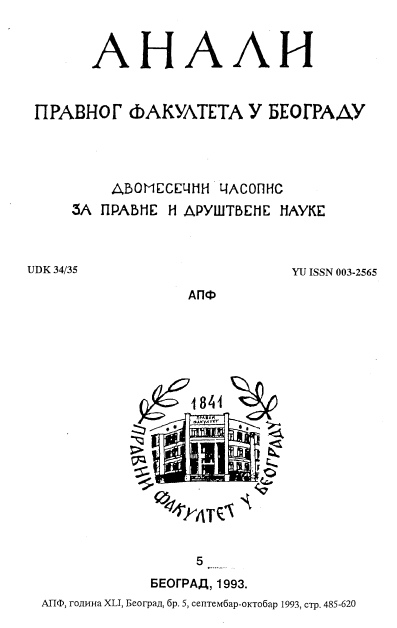ЕФИКАСНОСТ САНКЦИЈА УЈЕДИЊЕНИХ НАЦИЈА ПРОТИВ ЈУГОСЛАВИЈЕ - теоријске претпоставке и стварност
EFFICIENCУ OF THE UNITED NATIONS SANCTIONS AGAINST YUGOSLAVIA
Author(s): Vojin Dimitrijević, Jelena PejićSubject(s): Law and Transitional Justice, Geopolitics
Published by: Правни факултет Универзитета у Београду
Keywords: Sanctions; Effect; Aim
Summary/Abstract: The sanctions of the Security Council of the United Nations, imposed against the Federal Republic of Yugoslavia by the Resolution 757 had a two-fold aim. The immediate one was to influence Yugoslavia, namely Serbia, to change the policy regarding the war in Bosnia and Herzegovina. The indirect aim was to cause leadership and program changes of the regime in power in the larger of the two federal units of the newly-created state. None of these aims was realized during the initial six months of applying the sanctions. The effect of collective measures of international community in the period mentioned above has been primarily of a political nature, and symbolic, while economic consequences, although serious, were not expressed in full measure. The example of Yugoslavia does not fit into former results of theory of political effects of sanctions - in spite of expectations, during the first six-month period there were a series of actions against the policy of the authorities, which were accused to be a principal culprit for international isolation of the country. Official Serbia, however, followed the theoretically established model of conduct, calling, through state-controlled media, for national solidarity because of the alleged world conspiracy against people and not against regime. The results of December 1992 elections have confirmed the new distribution of forces in the political scene caused in great part by the sanctions, too. Support of the regime declined, while the number of those supporting opposition increased, but at the same time there was a growth of extremely nationalistic groups, which suggested that the mechanism of "gathering around the flag" began to manifest itself. Economic consequences, which are only a means to realize the political aim, are undoubtedly serious, although their full effect is hard to evaluate due to short time but also the state of Yugoslav economy before the sanctions were introduced. It is characteristic that the authorities have tried to undermine publicly the potential damage to the economy, while independent economists have warned that it would be very serious and of a long-term character. The official policy during the sanctions was not primarily aimed at the attenuation of their effect through adequate economic measures, but rather at maintaining, namely buying of the social peace.
Journal: Анали Правног факултета у Београду
- Issue Year: 41/1993
- Issue No: 5
- Page Range: 485-512
- Page Count: 28
- Language: Serbian

